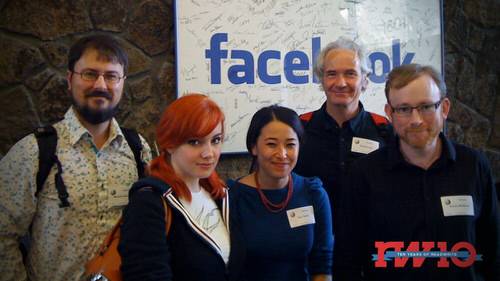
ReadWrite celebrates its 10th anniversary on Saturday, April 20, 2013. For the occasion, we’re running a series of articles looking back—and looking forward.
It’s hard to believe that ReadWrite went live an entire decade ago. Since founder Richard MacManus first hit the “Publish” button, an impressive roster of writers have contributed to the site in a wide variety of ways. Some have continued successful careers as technology journalists, while others have shifted their work and lives into entirely new directions.
To mark our 10th anniversary, we reached out to a handful of past writers and ask them about their experience with ReadWrite. What follows is a sampling of the thoughts, recollections and current situations of some of our most noteworthy alumni who responded. We encourage everyone who’s been involved with ReadWrite to chime in on the comments and let us know what they’re up to.

Richard MacManus (founder)
Years active: 2003 – 2012
What he’s up to now: Writing a book about consumer health technology.
(See also: RW10: A Decade of Spotting The Future Taking Form.)
What’s your most memorable ReadWrite moment?
There are too many memories to mention—perhaps I’ll write a book about it someday! But I’d have to say my favorite moment was meeting Tim Berners-Lee, the creator of the World Wide Web, in Boston in mid-2009. I interviewed him about a variety of topics, from the Semantic Web to the then nascent Internet of Things.
As I wrote in that post, Berners-Lee’s pioneering work and philosophy was a direct inspiration for me when I launched the site as ReadWriteWeb back in 2003. Immediately after shaking hands, I told him that ReadWriteWeb’s name was in part inspired by the first browser, which he developed, called “WorldWideWeb.” That was a read/write browser, meaning you could not only browse and read content, but create and edit content too. So it was a special moment meeting him in person.
How has ReadWrite changed you?
ReadWrite has changed me in so many ways. It’s fitting, though, that the key lesson I took from ReadWrite is the one that made me start the blog in the first place: to write about things I’m passionate about. Ten years ago, my avenue for writing was a blog called Read/Write Web. Now, it’s a book project. But either way, I’m doing what I love: writing.
As ReadWrite starts its next decade, what do you hope to see?
The DNA of ReadWrite is passion for technology and forward-thinking analysis of it. So I was thrilled to see that the new editor-in-chief, Owen Thomas, had embraced those principles. Also, the Web of 2013 is no longer just about what’s happening on your computer’s Web browser, as it was in 2003. As Owen noted in his debut post, the Internet is everywhere today—in our pockets, on our bodies, in the physical world. So I’m thrilled that the blog I founded will chronicle this new era of the Read/Write Web. Hopefully for at least another 10 years! Because I’m certain the next decade will bring many more exciting innovations and Web developments.

Marshall Kirkpatrick
Years active: 2007- 2012
What he’s up to now: CEO and founder of Little Bird, a tool that uses social data and other online signals to identify influencers.
How did you end up writing for ReadWrite?
After I was at TechCrunch, I joined a small startup in Portland, writing on their company blog and producing content using their technology. I was also doing some consulting on the side and some of that took the form of “blogger placement” with other companies seeking people to write on their blogs. (Mint.com was my biggest success story in that.) I was getting enough interest in both directions (though admittedly more from people wanting a job) that I put up a post on my own blog saying “OK, everybody, form two lines! Who wants to hire a blogger? Who wants a job blogging for a company? I will connect you!” And Richard MacManus reached out to me, asking “how much would it cost to hire someone of … your caliber?” And I said “oh let’s not beat around the bush—here’s what it would cost to hire me myself!” I knew even back then, when ReadWriteWeb had a staff of three, that it was one of only a small number of publications I’d be proud to write for (PaidContent, GigaOm, VentureBeat being among the others). Because Richard is a man who identifies deeply with intellectual exploration—and that’s awesome.
Richard said, “I’m looking for someone who can hit the front page of Digg on a regular basis.” That used to be the standard by which blogging success was judged! And so that’s just what I did, even as I was sometimes critical of the culture at Digg. This was one of the stories I was most proud of. And what other tech blog wrote explicitly and critically of Kevin Rose’s ignominious introduction of Digg to the world? But we got on the front page of Digg a lot and we just kept growing beyond the time when that mattered. After some time working as a contracted blogger, Richard brought me on full time. I announced that on my blog in the same post I announced that I was getting married to my wonderful wife and now Little Bird cofounder Mikalina. Our news hit Techmeme and that’s something we’ll always be a little proud of.
What’s your most memorable post or moment from your ReadWrite days?
There are far too many to recount. Every day was an adventure.
One of my favorite stories was when I was talking with Mike Melanson about a story we were hours late covering after it hit Techmeme and he said, “I don’t know why, we’ve covered that company several times in the past.” I thought that was a great structured criterion for elevating a source’s importance, and so we went over to a startup called FluidInfo that said it had a cloud database of all the outbound links in the history of ReadWriteWeb. I asked if they could populate a field that counted the number of times a particular domain had been linked to over the years. They said yes, so I asked staff hacker Tyler Gillies if he could hit their API and pull down that list. We got 2,000 domains that ReadWriteWeb had linked to more than two times in the past, we eyeball-edited out 500 competing news sites and personal blogs, and were left with 1,500 companies. There wasn’t a standard place to find their RSS feeds, everybody’s blogs were in different places on their site, so we tossed the list up onto Amazon’s Mechanical Turk and for $50 overnight got a set of 1.500 RSS feeds from companies we’d written about two or more times.
Then Tyler wrote a bot that would ping those feeds every five minutes to see if they’d posted anything new, and if they had the bot would send the link into a group Skype chat we called the Bot Room, filled with bots like that and more. All of our competitors had been getting real time push notifications from 20 or 30 company blogs (since I wrote about the ability to do that when I left TechCrunch). But we found a rational way to identify 1,500 companies worth tracking in real time. So we ate everybody’s lunch for months with real-time notifications of all these high-quality sources. It was awesome. We broke a lot of news like that. A lot of people thought that automated data-driven methods of breaking news were somehow less legitimate than other forms of journalism but I think they are wrong. It was a lot of fun, too.
What’s one lesson or idea that’s stuck with you since you left ReadWrite?
I learned that saying “Just go out there and be awesome” is not an effective way to manage people. It leaves them feeling frustrated, angry and like they don’t want to be your friend anymore. I’m really thankful for learning that and wish I had earlier. My wife Mikalina was instrumental in helping me learn that, based on our experiences together with ReadWriteWeb staff.
As ReadWrite starts its next decade, what do you hope to see more (or less) of?
I hope it’s epic, risky and filled with thoughtful integrity. I hope it sticks up for social justice and existential meaning. And I hope it monetizes well, so everyone engaged in epic, risky and filled with thoughtful integrity can get the double win of being well compensated for it.

Jolie O’Dell
Years active: 2009 – 2010
What she’s up to now: Writing for VentureBeat, freelancing elsewhere and publishing poetry books at Juniper Press
How did you wind up writing for ReadWrite?
I had been freelancing for a few tech sites and other blogs—I worked with Allen Stern (God rest his soul) at Center Networks and Steve Hall at Adrants. I was building up my portfolio of professional blogging after being a print journalist for several years. I was introduced to Richard by a mutual friend, and after exchanging some emails, he decided to take a chance on me. I started out at a rate of $25 per story and worked my way up to a full-time position, thanks to lots of coaching from Richard and [co-editor] Marshall [Kirkpatrick]!
What’s the most memorable moment from your ReadWrite days?
Definitely the time the staff met up in Palo Alto and went to Facebook in 2009. There were five or six of us—all alums now—and we had an amazing time riding [public transit] and eating at a cafe outside. But I will never forget how during our Facebook visit, the ever-feisty Marshall Kirkpatrick got “called in to the principal’s office” to talk alone with Mark Zuckerberg. He seemed rather abashed when he came out; I can only imagine he was getting chewed out majorly for being one of the first and best writers to really discuss Facebook’s privacy issues, especially when it came to children and commercial entities using the service.
What’s one lesson from those days that has stuck with you?
You can’t always be first, but you can always try to be best. And sometimes, you can be first and best.
Always think deliberately about what you write, and give every story an extra paragraph or two of analysis, context or background.
ReadWriteWeb changed my career forever. I wouldn’t be where I am today—making an obscene amount of money, sitting at the top of a skyscraper in San Francisco, happily married to a technology company founder—if it weren’t for Richard MacManus and his willingness to take a chance on me.
As ReadWrite starts its next decade, what do you hope to see?
I really hope that the ReadWrite spirit of beating the competition by writing better continues. The Internet is so saturated with “breaking” news and briefs and copy/paste fake journalism. ReadWrite has a reputation for being above that, for providing insight, depth and a unique point of view.
I dearly love Owen Thomas. He’s a personal friend; he’s also surprisingly intelligent. When we end up chatting about tech, he invariably brings up angles I would never have considered otherwise. In that regard, he reminds me a bit of Marshall. I’m so very excited to see what he does with the old place.

Jon Mitchell
Years active: 2011 – 2013
What he’s up to now: Launching an online publication called The Daily Portal.
How did you come to write for ReadWrite?
In 2011, I was working for a news tech startup experiment that seemed to be winding down, so I was moonlighting as managing editor for a local news site in Portland. Through working on that, I ended up attending events for Portland journalists hosted by Abraham Hyatt, long-time managing editor for ReadWrite. When Abraham posted a new writer job, I saw it very early, and I had the ability to say, “Hi, Abraham. I’m Jon. I helped you clean up after your PDX journo conference a couple months ago.” So that got me the interview, and being a bearded dude in Portland sealed the deal.
What was your most memorable ReadWrite moment?
At SXSW 2012, I caught wind early on of Homeless Hotspots, the ill-advised marketing experiment that became the only story to matter from the whole conference. I bashed out a reaction late at night and the momentum of that post carried me through to the morning. I went out and interviewed one of the homeless workers wearing a Wi-Fi hotspot around his neck, and posted a big second-day update to the post.
I got the link in Tim Carmody’s Wired post because I took a stand, and that pretty much made the week. I did a BBC World News radio interview, I got all kinds of links, it was a great moment. I was happy to be making an impact on a story that wasn’t about computers and telephones.
What’s one lesson from those days that has stuck with you?
“Blogging is a footrace and a beauty contest at the same time,” Marshall Kirkpatrick once said in the chat room. That sums up what I learned at ReadWrite. I learned to be plugged into the beating heart of the present, get the story, but never forget to tie it into the past and what it means for the future. A journalist’s number one job is to put the facts into context, and ReadWrite was known for that.
What would you like to see more of from ReadWrite in the next decade?
I want to see more features about the meaning of technology and the people behind it. The ReadWrite team is a bunch of philosophers. I want to see the site use that curiosity to push the medium forward.

Josh Catone
Years active: 2007 – 2008
What he’s up to now: Executive Director, Editorial Projects at Mashable.
How did you end up writing for ReadWrite?
Whenever anyone asks me how I got my start in blogging, I like to say I conned my way into it. While that’s not exactly true, it’s not far off. Somehow, I was able to go from toiling away at a mid-sized political website, for which only about a third of my writing actually carried a byline, to being lead writer for one of the sites that shaped the early blogosphere. And it all started with a comment.
In January 2007, I left a comment on a ReadWrite post that included an analogy Richard MacManus apparently liked so much that he turned it into a follow-up post a few days later. A month later, I reached out to Richard and offered to write some guest posts. All three of them hit the front page of Digg (back when that meant something), and in April 2007, Richard offered to let me run the entire site for a week while he was on vacation. When he got back, I hadn’t gotten him sued … so he gave me a job.
What was your most memorable post?
My favorite post is one entitled, “There Is No Web 3.0, There Is No Web 2.0—There Is Just The Web.” Anyone around the Web in 2008 will remember that defining what made a site “Web 2.0” was a popular pastime. I decided that while the discussions and debates about those definitions were helpful in figuring out where the Web was going, the actual attempt at assigning version numbers was not. This was my well-received rant.
Perhaps the most fun I had at ReadWrite was when I convinced Richard we should devote an entire week on the site to Facebook in the summer of 2007. I’m not actually sure if Richard was even on Facebook at the time. We spent an entire week writing posts about Facebook—resources, analysis, lists and news. We would later run other themed series as part of a program we called “ReadWriteWeb Files,” but Facebook stands out because it was first, and because we were one of the first major tech blogs to really devote significant virtual column inches to exploring the company.
What’s one lesson you’ve carried with you since leaving ReadWrite?
The most important lesson ReadWrite taught me was that it’s okay to take your time. It’s no surprise that when I was hired at Mashable, I started as Features Editor. That’s the ReadWrite influence at work. ReadWrite was built around the idea that thoughtful, deliberate and careful analysis has a ton of value.
What do you want to see more of on ReadWrite?
Get back to those roots as the best place for the smartest analysis of Web tech news and trends. News is a commodity; it’s an appetizer. ReadWrite should be serving the main course.

Mike Melanson
Years active: 2009 – 2011
How did you wind up writing for ReadWrite?
I hopped in a van to the Northwest with a guy at a festival and ended up in Marshall’s back yard in a tent for several weeks. Marshall and I walked around talking about technology a bunch and then I returned to my life in Austin to finish journalism grad school. When I finally graduated the next winter, I posted something on Facebook to the effect of “I hope this $3 I just spent on the Writers Market was the best $3 ever,” and Mikalina [Kirkpatrick] commented saying that Marshall just happened to be looking for a writer. And there it was.
What was your most memorable post for ReadWrite?
My most memorable post is quite obvious: Facebook Wants to be Your One True Login. And its corresponding post: How Google Failed Its Users and Gave Birth to an Internet Meme which sorta tells the story. That morning, when the traffic spike hit (we’re talking several hundred thousand pageviews over a couple days, if I remember correctly, with the post continuing to pull traffic for months) we were all in a Skype chat room trying to figure out what had happened. I think one of us had written about 4chan that day or the day before, so we thought perhaps /b [a message board devoted to mischief] was DDOSing us, attempting to bring the site down with an excess of traffic. Frederic [Lardinois] poked around in the stats and finally showed what was really going on—everyone was looking for Facebook. That’s when Marshall added the “Dear Facebook Users” message to the top of the post. And here I thought I was just writing an analysis of Facebook.
How did ReadWrite change you?
ReadWrite likely changed me in an unexpected way for a tech writer—it drove me back to my roots. When I left ReadWrite in 2011, I moved back to Austin and stopped looking at the Internet almost entirely for a couple months. My main focus on the Internet since those days is managing its ever-present draw. I’ve turned off the data plan on my phone, I’ve installed browser plugins to keep me from staring at Facebook and Reddit all day, I’ve turned off Twitter notifications, all sorts of things. ReadWrite taught me that while technology has its place, it also has a dark, ego-driven, addictive side that lots of the tech world has yet to really acknowledge.
What would you like to see more of on ReadWrite?
I’d like to see what I always liked to see—more well-sourced analysis and [real] journalism. Less of that other crap people try to pass off as journalism.

Audrey Watters
Years active: 2010 – 2011
What she’s up to now: Freelance writing and running Hack Education, a site about education technology.
What’s one lesson you’ve kept with you since leaving ReadWrite?
My most important takeaway from the time I spent at ReadWrite is that being “first” isn’t the goal. Rather you should strive to be “best.”
Being “best” doesn’t come from rewriting a press release or a company blog post (even if your rewrite hits Techmeme). Being “best” doesn’t mean creating a link-baity headline that garners the most clicks or retweets. Being “best” means adding value for your readers—that is, you want to help contextualize the news. You should talk to domain experts. You should add analysis.
You want to be the tech writer that people want to read on a topic … because they know that what you’ll say will be interesting and smart. “Interesting and smart” were always how I’d describe ReadWrite before I joined the team. It’s the lesson that I’ve carried with me after I left.
Where Are They Now?
These are only a few of the many great writers who have built ReadWrite over the years. We couldn’t possibly include everybody at length, but we would be remiss not to mention Sarah Perez, who wrote some excellent and widely-read stories during her tenure at ReadWrite. Today, she continues writing about mobile platforms and social media for TechCrunch, a site that also publishes work from ReadWrite alums Frederic Lardinois, Alex Williams and Klint Finley (who also writes for Wired).
There are many, many more who we couldn’t reach or didn’t have room to feature. We’re hoping to hear from them in the comments.










